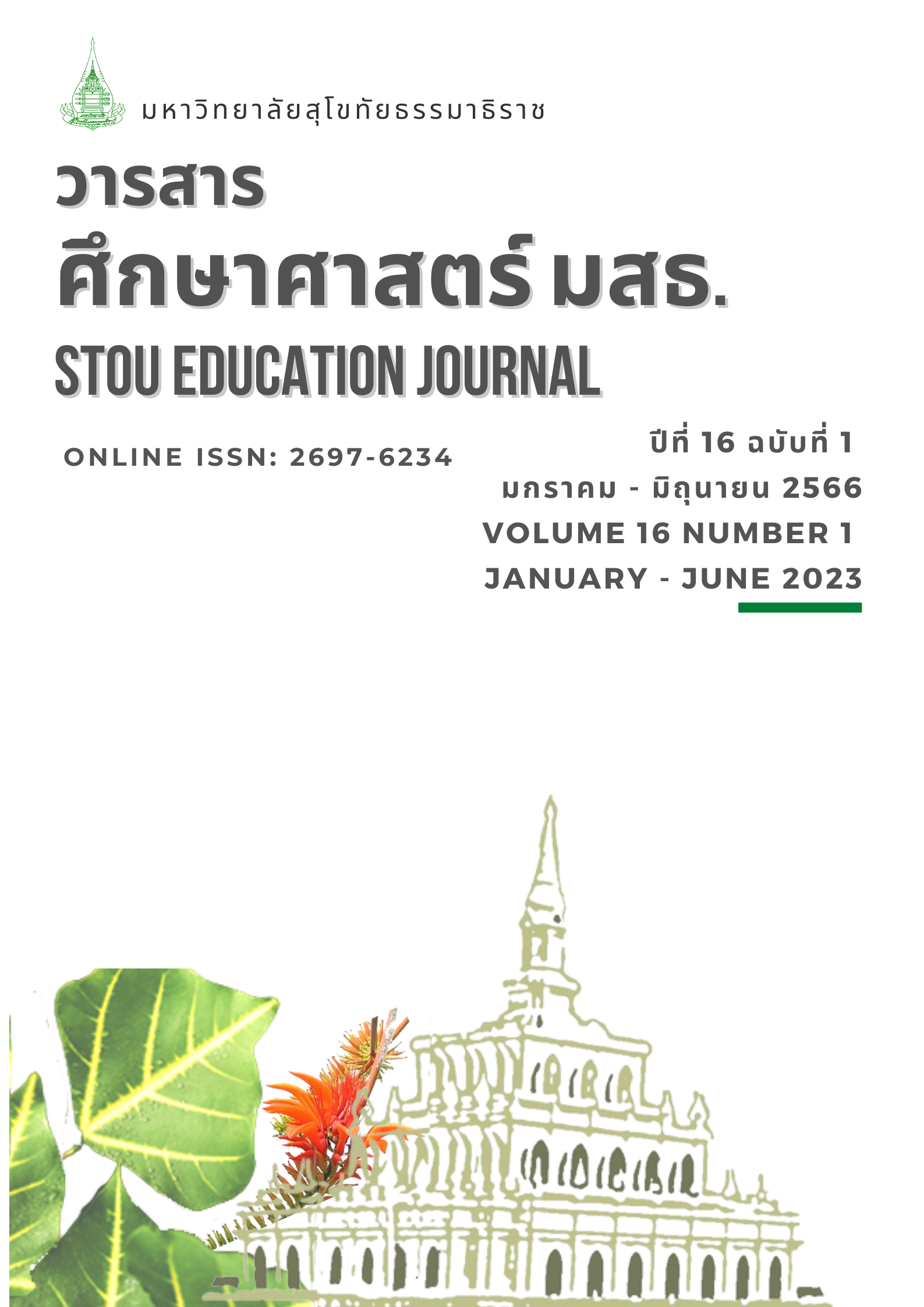Assessing Preschoolers’ Emotional Competence
Main Article Content
Abstract
This research aims were to construct and verify quality of emotional competence assessment forms for preschoolers. The samples were 20 purposively selected preschoolers who were studying in schools under Bangkok Primary Educational Service Area Office during the second semester of academic year 2020. Research instruments were two sets of emotional competence assessment forms for preschoolers, namely, emotional understanding assessment forms, and emotional observation forms. Research data were analyzed using the frequency, difficulty index, discrimination index, content validity index, and intra-class correlation. The results of the study were that 2 sets of emotional competence assessment forms for preschoolers were obtained comprising (1) three emotional understanding assessment forms on the elements of knowledge concerning the use of appropriate vocabulary to express emotion, and the recognition of the changing emotional states of the others in social facilitating behaviors, which were of both the short answers and multiple choice forms. The three emotional understanding assessment forms had the content validity index ranging from 0.60 -1.00, difficulty index ranging from 0.30 – 0.80, discrimination index ranging from 0.22 – 0.66, and reliability coefficients of 0.77, 0.76. and 0.78, respectively; and (2) the emotional observation forms for preschoolers on the elements of expressed emotion control, and emotional management, both of which were of the checklist form; their content validity indices ranged from 0.60 – 1.00; and the reliability coefficient in terms of correlation between evaluators being 0.92 for the element of expressed emotion control, and 0.96 for the element of emotional management.
Article Details
References
ณัฏฐภรณ์ หลาวทอง. (2561). การสร้างเครื่องมือการวิจัยทางการศึกษา (พิมพ์ครั้งที่ 2). สำนักพิมพ์แห่งจุฬาลงกรณ์มหาวิทยาลัย.
บัณฑิต ศรไพศาล. (2551). เด็กและเยาวชนเป็นต้นทุนแห่งอนาคต. ใน อาภรณ์ จันทร์สมวงศ์, จริยา เสนพงศ์, และครรชิต จูประพัทธศรี (บ.ก.), สุขสร้างสรรค์: เรื่องเล่าสุขภาวะหลากมิติของคน (น. 22-26). โครงการสนับสนุนการก่อตั้งกองทุนสุขภาวะกรุงเทพ.
ผกา สัตยธรรม. (2552). สุขภาพจิตเด็ก (พิมพ์ครั้งที่ 8). สำนักพิมพ์แห่งจุฬาลงกรณ์มหาวิทยาลัย.
ภัทราพร เกษสังข์. (2559). การวิจัยปฏิบัติการ Action research. สำนักพิมพ์แห่งจุฬาลงกรณ์มหาวิทยาลัย.
วรรณี แกมเกตุ. (2551). วิธีวิทยาการวิจัยทางพฤติกรรมศาสตร์ (พิมพ์ครั้งที่ 2). โรงพิมพ์แห่งจุฬาลงกรณ์มหาวิทยาลัย.
ศศิลักษณ์ ขยันกิจ และ บุษบง ตันติวงศ์. (2559). การประเมินอย่างใคร่ครวญต่อเด็กปฐมวัย แนวคิดและการปฏิบัติเพื่อสนับสนุนการเรียนรู้. สำนักพิมพ์แห่งจุฬาลงกรณ์มหาวิทยาลัย.
ศูนย์ทดสอบและประเมินเพื่อพัฒนาทางการศึกษาและวิชาชีพ. (ม.ป.ป.). เครื่องมือในการประเมิน. http://km.moi.go.th/km/32_quality_plan/evaluate/evaluate5_8.pdf
Bertrand, J., Bernhard, J., Blaxall, J., Field, J. D., Gordon, M., Goulet, M., Greenberg, J., Latulippe, J., Littleford, J., Maltais, C., Pelletier, J., Schmidt, B., Thompson, K., Varmuza, P., & Zimnyi, L. (2007, January). Early learning for every child today a framework for Ontario early childhood settings. http://www.edu.gov.on.ca/childcare/oelf/continuum/continuum.pdf
Biddle, K. A. G., Garcia-Nevarez, A., Henderson, W. J. R., & Valero-kerrick, A. (2014). Early childhood education. SAGE.
Campbell, S. B., Denham, S. A., Howarth, G. Z., Jones, S. M., Whittaker, J. V., Williford, P., Willoughby, M. T., Yudron, M., & Daring-Churchill, K. (2016). Commentary on the review of measures of early
childhood social and emotion development: Conceptualization, critique and recommendations. Journal of Applied Developmental Psychology, 45, 19-41. https://doi.org/10.1016/j.appdev.2016.01.008
Denham, S. A. (2006) Social-emotional competence as support for school readiness: What is it and how do we assess it? Early Education and Development, 17(1), 57-89.
Denham, S. A., Bassett, H. H., Brown, C. A., Way, E., & Steed, J. (2013). “I know how you feel”: Preschoolers’ emotion knowledge contributes to early school success. Journal of Early Childhood Research, 13(3), 252-262.
Denham, S. A., Bassett, H. H, & Zinsser, K. (2012). Early childhood teachers as socializers of young children’ s emotional competence. Early Childhood Education Journal, 40, 137- 143.
Denham, S. A., & Burton, R. (2003). Social and emotional prevention and intervention programming for preschoolers. Plenum.
Denham, S. A., Ferrier, D. E., Howarth, G. Z., Herndon, K. J., & Bassett, H. H. (2016). Key considerations in assessing young children’s emotional competence. Cambridge Journal of Education, 46(3), 299-317.
Division of Child Care and Early Childhood Education. (2016, April 2). Arkansas child development and early learning standards: Birth through 60 months. https://www.arheadstart.org/Ark_Early_Learning_Standards%20(19)%20(1).pdf
Garner, P. W. (2010). Emotional competence and its influences on teaching and learning. Education Psychology Review, 22, 297-321.
Housman, D. K. (2017). The Importance of emotional competence and self-regulation from birth: A case for the evidence-based emotional cognitive social early learning approach. International journal of child care and education policy, 11(13), 1 – 19. DOI 10.1186/s40723-017-0038-6
Miller, A. L., Gouley, K. K., Seifer, R., Dickstein, S., & Shields, A. (2004). Emotions and behaviors in the Head Start classroom: associations among observed dysregulation, social competence, and preschool adjustment. Early Education and Development, 15(2), 147–165. https://doi.org/10.1207/s15566935eed1502_2
Nissen, H., & Hawkins, C. J. (2010). Promoting emotional competence in the preschool classroom. Childhood Education, 86(4), 255-259.
The British Association for Early Childhood Education. (2012). Development matters in the early years foundation stage (EYFS). https://www.foundationyears.org.uk/files/2012/03/Development-Matters-FINAL-PRINT-AMENDED.pdf
Teekavanich, S., Chantaratin, S., Sirisakpanit, S., & Tarugsa, J. (2017). Prevalence and factors related to behavioral and emotional problems among preschool children in Bangkok, Thailand. Journal of Medical Association Thailand 2017, 100(2), 175-182.


